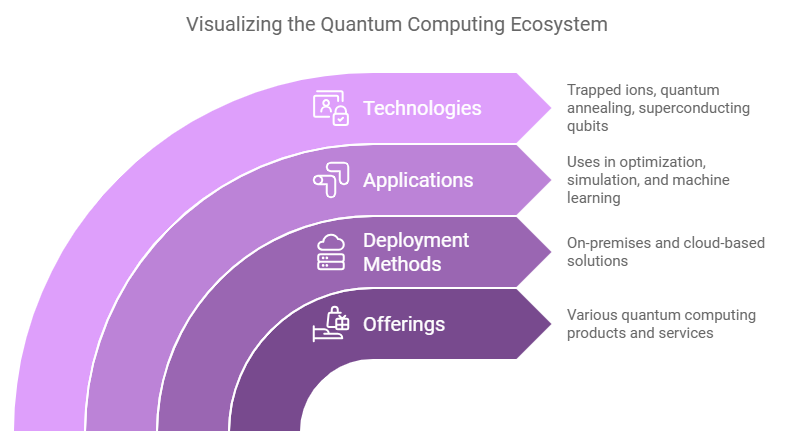The world is on the cusp of a technological revolution, and at the heart of it lies quantum computing. Once a distant dream of scientists and futurists, quantum computing is rapidly transforming from theory into practical application. This next frontier promises to unlock untapped potential and redefine industries across the globe, from healthcare to finance, and cybersecurity to artificial intelligence. The quantum computing industry is no longer a niche area of research; it’s a burgeoning sector attracting investment, talent, and groundbreaking innovations that are poised to change the future.

What is Quantum Computing?
At its core, quantum computing leverages the principles of quantum mechanics to perform computations far beyond the reach of classical computers. Classical computers process information in binary form—0s and 1s. Quantum computers, however, utilize quantum bits or qubits, which can exist in multiple states simultaneously, thanks to quantum phenomena like superposition and entanglement. This ability allows quantum computers to solve complex problems much faster than their classical counterparts, opening doors to advancements that were once thought impossible.
The Quantum Computing Industry size is valued at USD 1.3 billion in 2024 and is anticipated to be USD 5.3 billion by 2029; growing at a CAGR of 32.7% from 2024 to 2029. The key factors contributing to the growth of the quantum computing industry include quantum computers, which have the potential to outperform classical computers vastly for certain types of problems. Tasks that are computationally intensive or classical computers face challenges when tackling certain types of issues, such as factoring large numbers or accurately simulating quantum systems. This increased computational power drives demand from industries seeking solutions to complex problems.
The Rise of the Quantum Computing Industry
In recent years, the quantum computing industry has seen significant growth, driven by advancements in research, technological development, and investment. Major tech companies like IBM, Google, and Microsoft, as well as specialized startups, are investing heavily in quantum computing technology. Governments are also throwing their weight behind it, recognizing quantum computing as critical to national security and economic leadership.
Key Drivers of Growth
Increasing Investment
The quantum computing industry has attracted substantial investment from venture capitalists and government-backed programs. Billions of dollars are being poured into research and development (R&D) to accelerate the progress of quantum hardware, software, and algorithms. For instance, the U.S. government announced a $1 billion initiative to advance quantum technologies, further signaling the growing importance of this industry.
Technological Advancements
While quantum computing is still in its infancy, significant strides have been made in recent years. Companies like IBM and Google have achieved quantum milestones, such as quantum supremacy, where a quantum computer performed a calculation that would take classical computers thousands of years to complete. As these advancements continue, the industry is moving closer to solving the scalability and stability challenges that have historically limited the power of quantum systems.
Download PDF Brochure @ https://www.marketsandmarkets.com/pdfdownloadNew.asp?id=144888301
Cross-Industry Applications
Quantum computing promises transformative applications across various industries. For instance, in pharmaceuticals, quantum simulations could drastically reduce the time required to discover new drugs, improving healthcare outcomes. In finance, quantum algorithms could enhance risk modeling and fraud detection, revolutionizing the way financial institutions operate. AI and machine learning could be significantly improved by quantum computing, allowing for faster, more accurate pattern recognition and data analysis.
Talent and Expertise
As the quantum computing industry grows, so does the demand for highly skilled professionals. From quantum physicists to computer scientists, the need for experts in quantum algorithms, quantum hardware, and software development is skyrocketing. This surge in talent is further accelerating innovation, ensuring the continued progress of quantum technologies.
Challenges Facing the Quantum Computing Industry
Despite its promising future, the quantum computing industry faces several challenges:
Technical Barriers
Building a practical, scalable quantum computer remains a monumental challenge. Qubits are highly susceptible to quantum decoherence—a phenomenon that causes them to lose their quantum state. Moreover, creating quantum systems that can handle large-scale computations without errors is an ongoing hurdle. Researchers are exploring various technologies, such as superconducting qubits and trapped ions, to overcome these challenges.
Hardware Limitations
Currently, quantum computers require extremely cold temperatures (near absolute zero) to maintain the stability of qubits. This makes quantum hardware complex and costly to develop and maintain. Researchers are working on developing quantum systems that can operate at higher temperatures, which would make them more practical for everyday use.
Cybersecurity Concerns
While quantum computing holds the potential to break traditional encryption methods, it also presents an opportunity to create next-generation, quantum-safe encryption methods. The rapid development of quantum computing means that industries reliant on security, such as finance and defense, must start preparing for the potential threats quantum computing poses to current cryptographic systems.

The Future of the Quantum Computing Industry
The future of quantum computing is incredibly exciting, with the industry poised for rapid innovation and expansion. In the short term, quantum computers will complement classical systems, tackling specific problems that are currently too complex for traditional computers to handle. Over the next decade, we may see quantum advantage—where quantum computers outperform classical computers in more general applications.
In the long run, quantum computing could lead to the development of entirely new technologies, unlocking capabilities that we can’t even fully imagine yet. From quantum-enhanced artificial intelligence to breakthrough discoveries in materials science, the possibilities are limitless.
The quantum computing industry is laying the foundation for a new era of technological advancement. As research progresses, partnerships expand, and investment continues to pour in, we can expect quantum computing to become an integral part of our technological landscape in the coming years. Industries worldwide are already beginning to position themselves for the quantum future, and the race is on to harness the full power of quantum systems.
Quantum computing is not just a scientific curiosity; it’s the next frontier in technological innovation. The growth of the quantum computing industry is a testament to the enormous potential of this transformative technology. As the industry continues to evolve, it will pave the way for advances that will redefine our understanding of what’s possible in computation. The future is quantum, and it’s closer than we think.